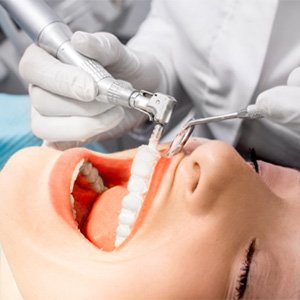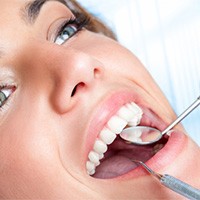Gum Disease Treatment – Huntington Beach, California
Renew Oral Health & Enhance Your Smile

When it comes to maintaining oral health, preventing tooth decay and damage is only half the battle. Ensuring optimal oral health also means preserving healthy gum tissue. Periodontal (gum) disease is one of the most common oral health conditions affecting adults, and in addition to adversely impacting your oral health, gum disease has also been linked to whole body health concerns, including heart disease, diabetes, and stroke. Luckily for Huntington Beach residents, the dedicated dentist and team at Pacific View Dental Group are here to help. We provide preventive dental services, periodontal maintenance, and gum disease therapies to help patients achieve and maintain their healthiest smiles. If you’re ready to learn more about gum disease treatments, call our dental office in Huntington Beach to schedule your gum disease therapy consultation visit today. We look forward to hearing from you.
What is Gum Disease?

Gum disease is an oral health condition that occurs when oral bacteria breakdown nutrients, producing the sticky, acidic biofilm known as plaque. In some cases, saliva neutralizes the acids, but in other cases, plaque clings to teeth and gum tissue. Overtime, the plaque buildup can harden into tartar. The acidic plaque and tartar irritate and even destroy gum tissue. This causes the space between teeth and gums to grow larger, allowing more plaque to accumulate and further damage the gums.
Do I Have Gum Disease?

The early stages of gum disease, referred to as gingivitis, have very mild symptoms, and it can be difficult for an untrained observed to notice there’s an issue. As gum disease advances into the more severe form, periodontitis, symptoms will be increasingly pronounced. You should let your dentist know right away if you notice any of the following symptoms:
- Gums that bleed while brushing or flossing
- Red, purple, or discolored soft tissue
- Inflamed or irritated gums
- Infection or sores on the gums
- Foul taste in the mouth or chronic bad breath
- Receding soft tissue or teeth that appear longer
- Teeth that shifts or a bite that doesn’t fit together properly
How is Gum Disease Treated?

In the mild gingivitis stage, gum disease may be treatable with improved at-home oral hygiene and more frequent professional teeth cleanings. In more advanced stages, we may need to provide a deeper cleaning procedure called scaling and root planing. Scaling is the systematic removal of plaque and tartar buildup at and below the gum line, and root planing is the smoothing of the tooth roots to prevent future buildup and keep smiles healthy. We may also offer an oral or topical antibiotic. This will limit the numbers of plaque producing bacteria in the mouth, reducing risk for continued oral health concerns. Additionally, patients will need to take better care of their smiles at-home and visit us three or four times a year for cleanings rather than the typical twice a year visits.
Scaling & Root Planing

At Pacific View Dental Group, we offer a variety of gum disease treatments because we know how important your gum tissue is for a healthy smile. If your gum disease persists past the stage of gingivitis, Dr. Arditti may recommend scaling and root planing. Also called a deep cleaning, this treatment can effectively halt the progression of infection and inflammation while also making it less likely for you to be affected by this problem in the future. Read on to learn more about this option!
Gum Disease FAQs
Gum disease remains to be one of the most common chronic conditions not just in the United States, but around the world! Most people underestimate the seriousness of dental conditions like gum disease, but there’s good news to be had. Our office is happy to answer any and all of your most common questions and make sure you know what to expect should you need treatment. Below, you can find our responses to these commonly asked questions. If yours is not mentioned, feel free to give us a call!
Do I still need gum therapy if my gums don’t hurt?
Yes. It’s not impossible for dental patients to be experiencing gum disease, including advanced stages of the condition, and still notice little to no discomfort in the process. In the early stages, it’s especially common for patients to not experience any discomfort whatsoever. Even if it doesn’t feel like you have gum disease, our detailed exams will be able to confirm if it’s actually present. This is just another reason why routine exams are so important every six months.
What puts my gums at higher risk for infection?
While poor oral hygiene is a common culprit, another habit that will put your gum tissue at high risk is using tobacco in any form, whether it’s smoked or chewed. However, those who have underlying conditions like diabetes can also be at higher risk of developing the condition. If you are taking certain medications, including anti-epilepsy drugs, cancer therapy medications, or steroids, you may experience dry mouth, a side effect that makes it easier for gum disease to develop. If you are pregnant, extreme hormonal changes can also increase the risk for gum disease.
How do I prevent gum disease?
The key to reducing your risk of gum disease is to practice positive habits that prevent it from developing in the first place. This includes brushing twice a day with a fluoridated toothpaste and flossing at least once a day (an especially important habit as it removes plaque and food debris that’s touching the gums directly. You should also avoid smoking at all costs, eat a healthy diet balanced with fruits and vegetables, reduce your consumption of sugary or starchy foods, and maintain regular exams and cleanings at our office.
Can gum disease be cured?
When gum disease exists in the early stages, it’s still possible to remove the plaque and tartar that’s causing problems and make improvements to your oral hygiene, effectively preventing severe stages of gum disease from developing. However, if it reaches the advanced stages, also known as periodontitis, it is effectively permanent and can only be managed from there. This includes completing deep cleaning therapy (such as scaling and root planing) and making visits to our office every three to four months for routine cleanings, rather than every six months.
Is it possible to replace damaged gum tissue?
It’s possible to replace damaged gum tissue that needed to be removed as a result of gum disease through a process known as gum grafting. This treatment involves taking oral tissue from other areas of the mouth (such as the soft palate), placing it on the gums, and suturing it so that it integrate where it’s needed. While this can help regrow tissue over time, it’s always better to stay proactive so you don’t need to complete this option in the first place.
